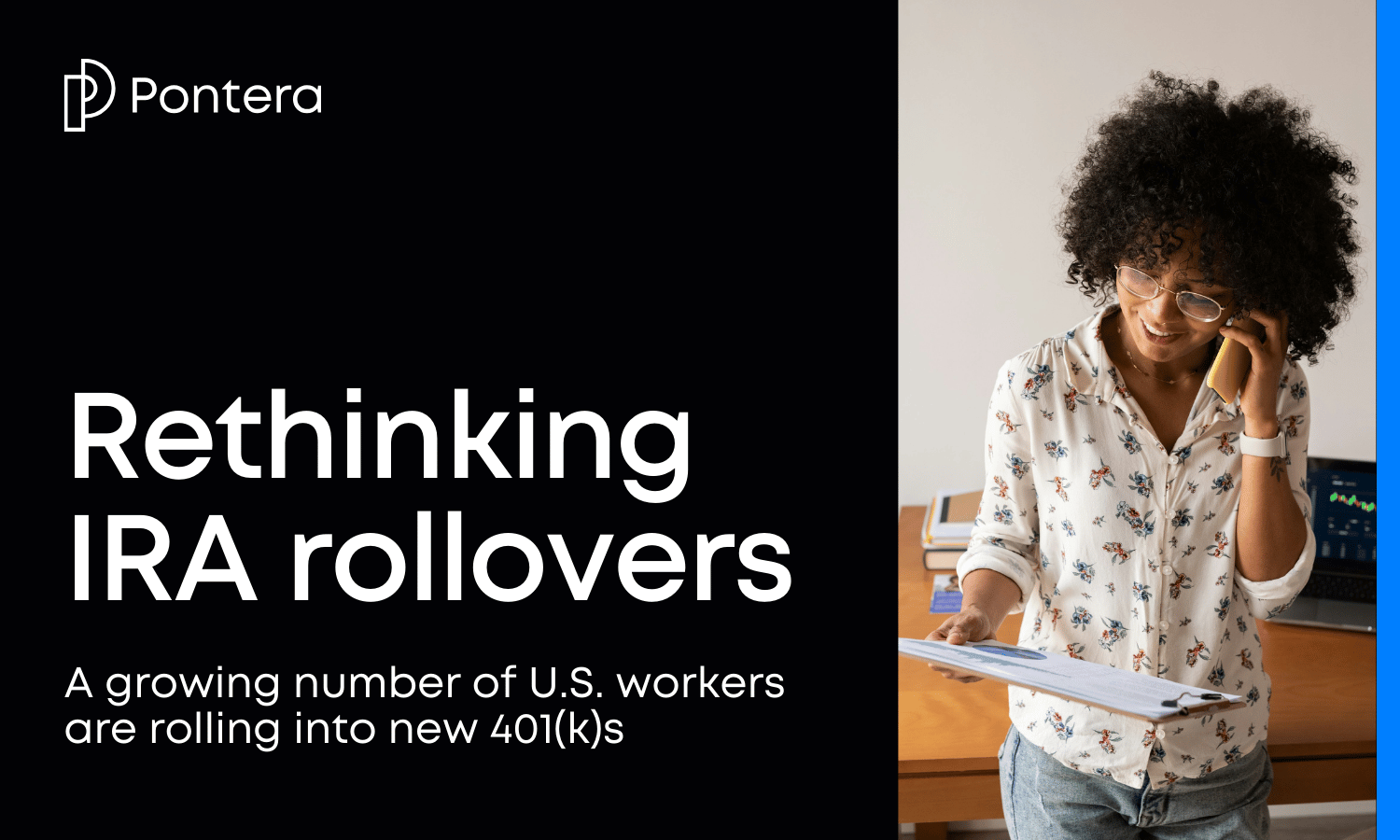Rethinking IRA rollovers: A growing number of U.S. workers are rolling into new 401(k)s

Published: November 11, 2024
When workers transition jobs, they have a tough decision to make about what to do with their 401(k) or other employer-sponsored retirement account. There are many options—keep their current account, withdraw the funds entirely, roll them into a new employer-sponsored plan, or roll into an IRA—all with their own pros and cons.
For years, the volume of 401(k) assets transitioning into IRAs surged to new highs. But a recent study by Pontera and The Harris Poll found that Americans are more likely to roll over their employer-sponsored account to a new employer’s plan rather than into an IRA, driven by advantages like employer matching and lower fees. With millions of individuals holding accounts like 401(k)s, understanding the factors behind these preferences can provide valuable insight into the evolving U.S. retirement landscape.
Know the differences
Both employer-sponsored retirement plans—like 401(k)s and 403(b)s—as well as non-qualified IRAs are reliable options for individuals saving for their future. But these accounts have key differences, and savers may find that one option better aligns with their personal financial goals and circumstances.
401(k) versus IRA: An individual can open a 401(k) only if their employer offers one. Often, the employer will offer a match or contribution to encourage employee participation. However, 401(k) investments are limited to those offered by the plan sponsor. In contrast, anyone with taxable income can open a traditional IRA. While there’s no employer match, individuals have control over how and where to invest.
Roth versus traditional: Both 401(k)s and IRAs offer Roth and traditional options, where the main difference lies in their tax treatment. Roth accounts are tax-advantaged, where contributions are made with post-tax dollars and money grows tax-free. Traditional accounts are tax-deferred, and contributions are made with pre-tax dollars, which reduces taxable income now, but subjects withdrawals to income tax in the future.
Beyond tax advantages, other factors can influence the decision of where to roll over. According to the Pontera 401(k) Literacy Survey, the top reason respondents said they would choose to roll over their funds into a new employer-sponsored plan is the ability to receive an employer match (39%).
They also cited preferring to pay lower fees (36%) and being able to choose from more or better investment options (36%). Moreover, some may prefer to consolidate their accounts for easier management, avoiding the hassle of tracking multiple savings accounts. Alternatively, a plan participant may be discouraged from rolling over a 401(k) into an IRA because of a lack of loan options, a decrease in creditor protection, and the loss of a possible earlier withdrawal without penalty.
Overall, the study found that 51% of workers rolled their workplace accounts into a new employer’s plan, and only 43% into an IRA.
Don’t neglect your retirement account
If 401(k)s aren’t rolled over, they run the risk of becoming stale: retirement savers may unintentionally miss out on nearly $700,000 over their lifetime by forgetting about old accounts, as they tend to have higher fees and lower investment returns. The longer these accounts are left unmanaged, the worse the investment allocation becomes.
Those who self-manage their IRAs also may inadvertently forfeit potential growth by letting their funds sit in cash, a phenomenon commonly called the “billion-dollar blind spot.” When rolling over into an IRA, retirement assets are typically placed in cash by default, unless the saver actively reallocates them. According to Vanguard research, 77% of savers who rolled over into an IRA—despite having prior investing experience—left their accounts in cash rather than investing in stocks or other assets.
These oversights can severely limit growth potential, making it crucial for savers to roll over their funds into better-performing accounts, and not let them sit idle in cash, in order to optimize their retirement savings.
401(k) management
A common misconception—and historically a motivating reason for rolling over to an IRA—is that financial advisors are able to manage IRAs but cannot actively manage 401(k) accounts, and that personalized retirement guidance only comes through free, informal advice.
Solutions like Pontera make it possible for savers to receive the same level of professional guidance on their retirement accounts without needing to rollover to IRAs, enabling them to make choices that align with their best interests and eliminating the need to choose between their advisor and their 401(k). In fact, according to Pontera’s 2023 Financial Advisory Survey, 59% of advisors chose not to roll over a client’s 401(k) into an IRA because of their ability to manage these assets holistically in plan via Pontera. This is especially important given that 81% of workers believe their 401(k) is the most crucial asset to obtaining a stable financial future, surpassing both traditional and Roth IRAs.
Research shows that professionally managed 401(k)s can outperform self-managed accounts by 3% a year, net of fees, amounting to 75% more growth over the span of 20 years. While starting to save now is crucial, pairing it with professional guidance on retirement accounts can make all the difference for a secure future.
Ultimately, the decision of how to roll over accounts hinges on the individual’s financial goals and overall investment strategy. Whichever choice the participant makes, saving for retirement and proactive management are essential. Seeking professional guidance can enhance the growth of retirement accounts and empower individuals to secure a stable financial future.
Discover more insights from the full survey here.
